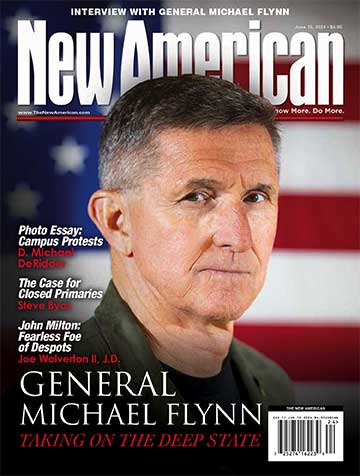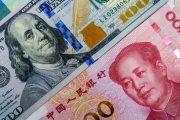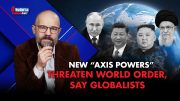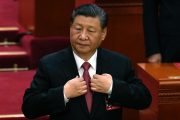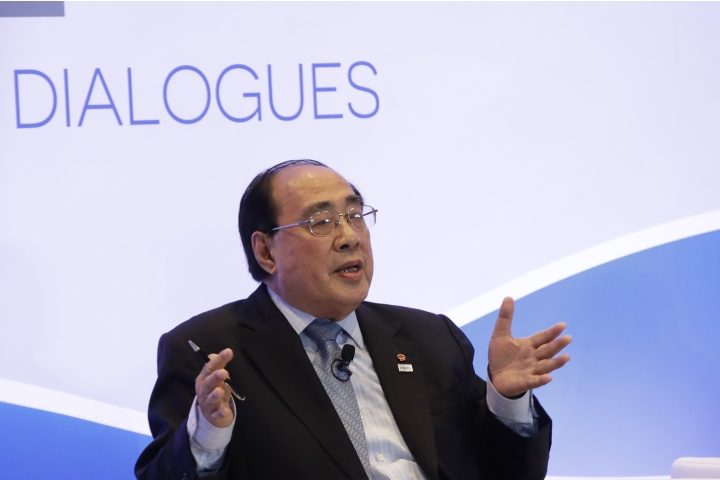
The European Union must not drive Russia “into a corner,” but instead sit down for negotiations with Moscow, if it hopes to end the conflict in Ukraine, China’s envoy to Europe stated on December 6.
Speaking to the state broadcaster CGTN, Special Representative on European Affairs Wu Hongbo said that he had cautioned his EU counterparts from the outset that “military intervention or sanctions” would not prevent Moscow from conducting its military operation in Ukraine.
“They wouldn’t believe us,” Wu said, elaborating that “since the sanctions did not work at all and the military supplies only added fuel to the fire,” EU officials have asked the Chinese Foreign Ministry and Chinese diplomats to “convince [Russian President Vladimir] Putin to put a stop to the conflict.”
Wu elaborated that he told the Europeans not to “overestimate our influence on Russia,” and reminded them that “Russia is an independent sovereign state.”
“We also said that the issue should be handled with care,” Wu declared. “If you continue to push and there is no way for the other to maneuver, it’s like you drive someone into a corner and it will be very difficult for the two sides to sit down.”
Moreover, Wu maintained that the conflict can only be resolved with a “negotiated settlement,” and that Russia has to be involved in whatever security framework that takes shape in Europe afterwards.
The day after Wu’s interview, Chinese President Xi Jinping met with European Council President Charles Michel and European Commission President Ursula von der Leyen in Beijing. Although von der Leyen told Xi that “it is essential to put an end to the Russian aggression against Ukraine,” a readout of the meeting from the Chinese Foreign Ministry simply said that the EU side would like to “work for the settlement of regional hotspots including Ukraine and the Middle East.”
In meetings with Xi and his officials earlier this year, French President Emmanuel Macron and German Chancellor Olaf Scholz both called on the Chinese government to persuade Putin to back out of Ukraine. Both the French and German leaders were unsuccessful, with Xi continuing to tout China’s 12-point roadmap to addressing the conflict, and the two EU state leaders returning to their strategies of weaponizing Ukraine while insisting that Kyiv alone will determine when to call for peace.
Last week, EU leaders also told reporters in Beijing that the bloc might single out and possibly sanction more than a dozen companies based in China for supplying Russia goods that might be used in the Ukraine conflict.
Von der Leyen and Michel were in China on December 7, meeting with Xi and Premier Li Qiang.
Von der Leyen said she had asked Xi “to prevent any attempts by Russia to undermine the impact of sanctions.” Michel handed the Chinese leader a list of 13 firms the EU has accused of selling “dual-use goods” to Russia and requested that Xi “immediately” deal with the problem, as per a report by Politico EU.
“We have identified a list of companies which are suspected to play a role in circumventing our sanctions,” Michel told reporters after the summit. “We sincerely hope that today we are heard, and then the appropriate action will be undertaken by China.”
If Beijing fails to clamp down on the companies, the EU might “name and shame” them and “the member states will have to decide what further action to be done,” Michel warned.
The United States and its EU allies have enforced sanctions on Russia over the Ukraine conflict and sent billions of euros and dollars to back the Kyiv regime, all the while claiming that they were not de facto participants in Russia-Ukraine hostilities. China has declined to go along with the EU’s playbook, slamming these sanctions as “unilateral measures.”
“China is opposed to violations of the basic principles of market economy, [and] the politicization and securitization of economic and trade issues,” Li said after meeting with Michel and Von der Leyen. He added that Beijing “hopes that Europe would be cautious in rolling out restrictive trade policies and using trade remedies.”
Although Chinese Foreign Ministry spokesman Wang Wenbin did not address the sanctions threat at the regular press briefing on December 8, he gave comments regarding EU fears about the rising trade deficit with China, which doubled to almost 400 billion euros between 2020 and 2022.
The imbalance is the consequence of “macro-economic environment, international trade conditions and the two sides’ industrial structures,” Wang told reporters, pointing out that the soaring deficit was “largely affected by energy price and geopolitical factors.” The EU has met with snowballing energy costs after imposing restrictions on Russian oil and natural gas.
“China is not to blame for the inadequate impetus for the EU’s industrial growth, and the EU should not take this as a pretext to adopt trade protectionist measures,” Wang said, adding that if the bloc wants to address the imbalance, it could “ease the export restrictions on high-tech products.”
After the European Commission threatened it could soon implement protectionist measures to protect local industry from Chinese firms, China responded by inviting EU member states to leverage its “mega market.” Speaking during a press briefing on December 6, Wang Wenbin was asked whether Beijing was worried about a “trade war” with the EU, in light of recent remarks by von der Leyen.
“China has never deliberately sought a trade surplus. On the contrary, we have consistently advanced high-level opening up and invited all countries to share China’s mega market with a population of over 1.4 billion,” Wang said, adding that “the current China-EU trade situation is a result [of] the combined influence of the macro-economic environment, international trade conditions and the industrial structures of the two sides.”
